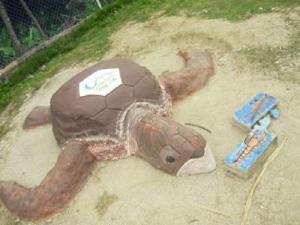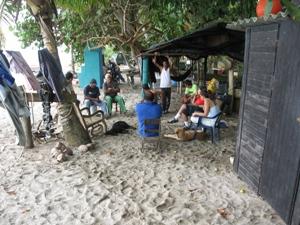Maria Carolina Monterrosa
Other projects
26 Apr 2009
Understanding the Relationship Between Abiotic Factors and Hatchling Success of Dermochelys coriacea in Tayrona National Park
26 Aug 2011
Proyecto Help Colombia – Community Based Sea Turtle Conservation Program in the Colombian Caribbean
Colombia Marina aims to diminish the pressure in sea turtles while promoting social participation in the design of new activities for economic income generation which permit self sufficiency.

The socio-economic situation in the coastal communities has developed among them the idea that conservation of natural resources is against their survival and economic incomes. To change their subsistence habits and become them conservation allies in the long term, through alternative economic activities can result in a new conservation concept.

The non-consumptive turtle-based economy should result in the long-term conservation of turtles. In this way, turtle-based lifestyle can generate income and provide employment whilst supporting the conservation of marine turtles.
Realistic conservation practices must be integrated with, and supported by, the communities that interact with the turtles and their habitats. It is fundamental to appreciate that the condition of the environment is intimately related to the status of human communities, and in many cases community-based conservation (CBC) is considered part of community development. CBC it is essential for realistic, long-term conservation of shared resources. For example, hiring fishermen to carry out sea turtle conservation and management activities not only provide an alternative source of income, it also makes future resource administration by the community possible.
Involving community: The hire of key fisherman among the community to develop sea turtles protection and management activities along the research team, will halt the eggs poaching and the females slaughtering, while provide them with an alternative activity and recognition among the community. Their presence discourages external poachers, so steal eggs becomes less viable.
Environmental education: Essential for the success, the program will mainly target the youth of the neighbouring communities, providing short courses that educate about sustainable activities and conservation. They´ll learn about marine turtle biological characteristics, conservation, tour guide procedures, and manufacturing of recyclable paper and paper bags. After this training, the children who demonstrated the greatest ability to communicate their knowledge will be considered to participate during the hatchlings release activities and they´ll receive incentives for the production of the elements that are going to be sale in the same events.
Identifying alternatives activities: Like a part of the social inclusion politic, workshops directed to the women of the community, will be done looking for the identification of alternative activities that they would like to do. At the same time, handcraft manufacturing will be proposed by Colombia Marina, with hired teachers and given materials.